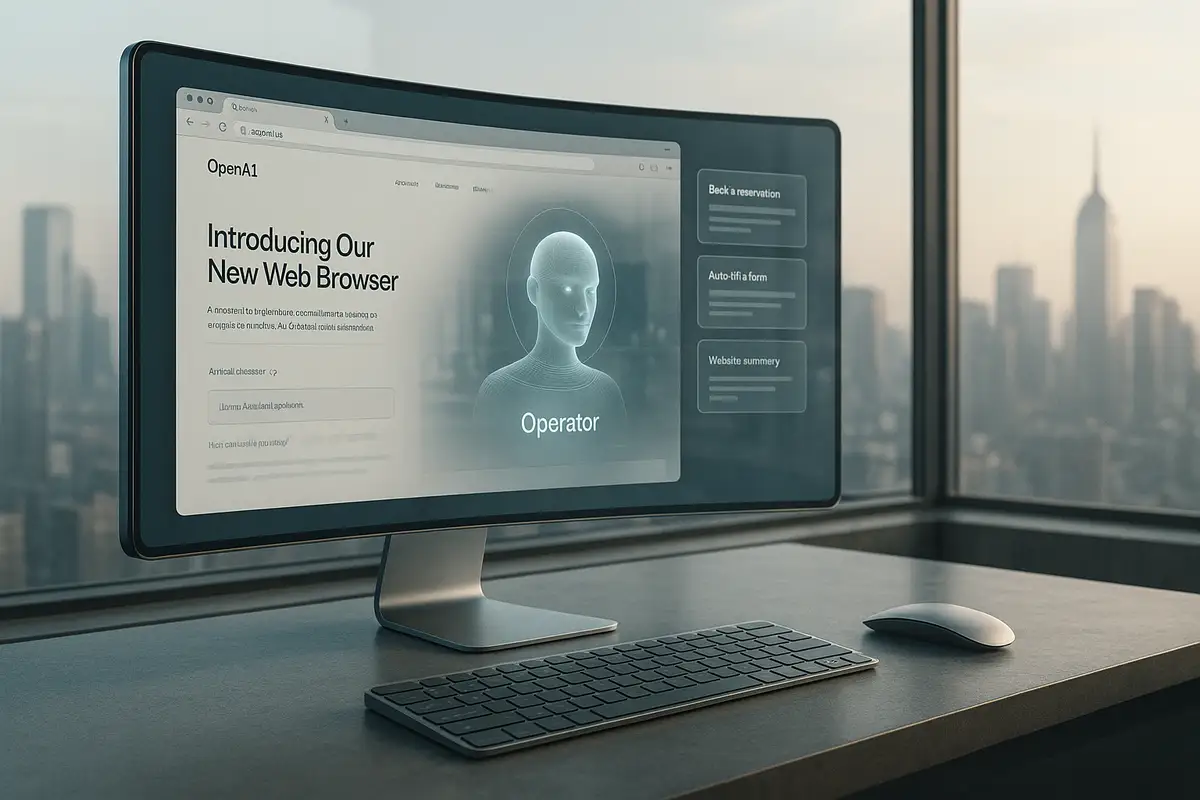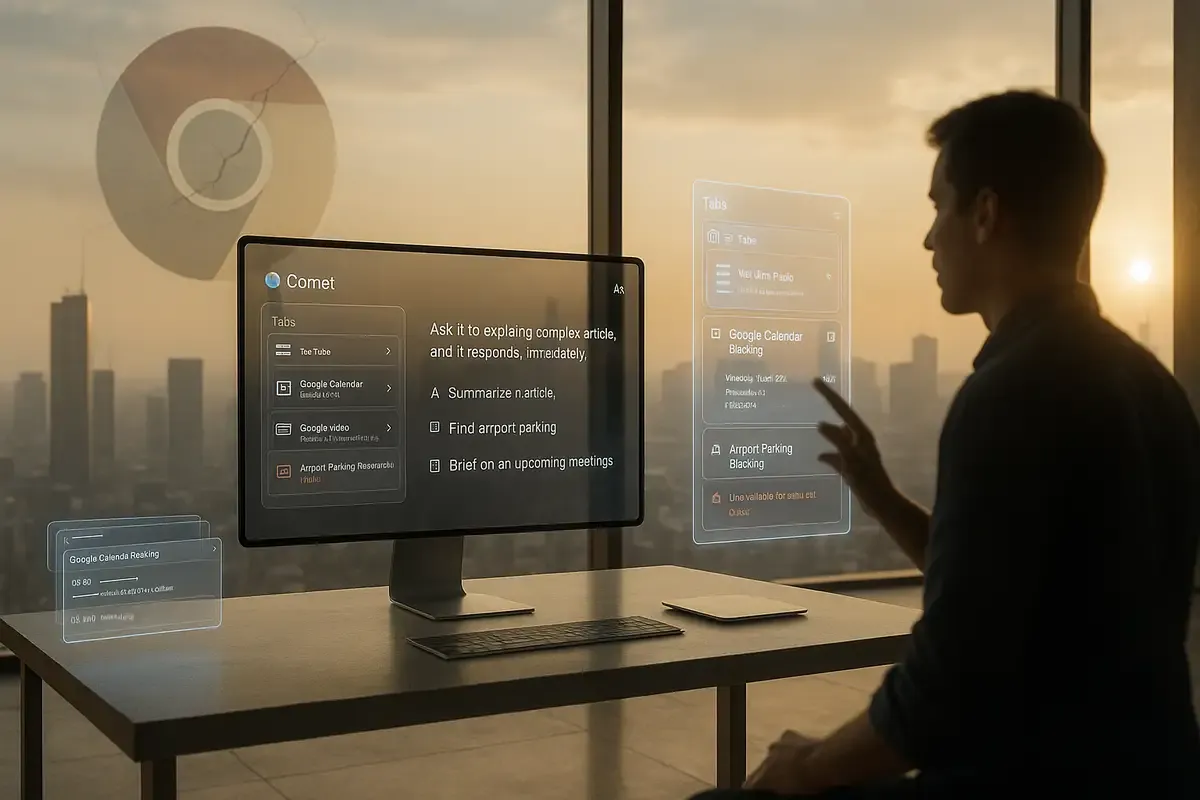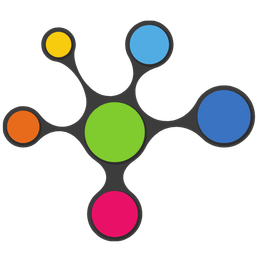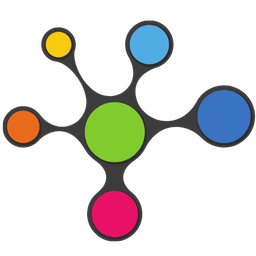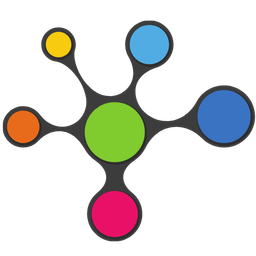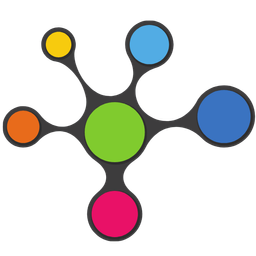💡 TL;DR - The 30 Seconds Version
👉 Perplexity launched Comet, an AI-powered browser targeting Google Chrome's 68% market share through built-in search and task automation.
📊 Available to $200/month Max subscribers first, with Perplexity processing 780 million monthly queries and growing 20% month-over-month.
🏭 The browser's AI assistant sits in a sidebar, requiring extensive Google account permissions to manage emails, calendars, and web tasks.
🌍 Testing shows Comet works well for simple tasks like summarizing content but fails on complex requests due to AI hallucinations.
🚀 The launch intensifies AI browser competition as OpenAI considers its own browser and Google adds AI features to Chrome.
Perplexity launched Comet on Wednesday, an AI-powered browser that wants to replace your relationship with Google Chrome. The startup thinks people are tired of managing dozens of tabs and hunting through search results. Instead, Comet offers a built-in AI assistant that can summarize emails, book meetings, and handle routine web tasks.
The browser arrives as Perplexity fights a two-front war. The company wants to steal search traffic from Google while also grabbing browser market share from Chrome's commanding 68% slice. It's an ambitious play for a startup that processes 780 million queries monthly—impressive, but still a fraction of Google's billions.
Comet launches first to subscribers paying $200 monthly for Perplexity Max, with broader access rolling out through summer invites. The pricing suggests this isn't aimed at casual users, at least not yet.
The AI Assistant That Lives in Your Browser
Comet's main feature is its AI assistant, which sits in a sidebar and can see whatever webpage you're viewing. Ask it to explain a complex article, and it responds instantly. The assistant can also dig through your Gmail and calendar to brief you on upcoming meetings.
This sounds useful in theory. Our testing found it works well for simple tasks like summarizing LinkedIn posts. The assistant successfully answered questions about Google Docs we were editing and provided context about calendar events.
But the system breaks down with complex requests. When asked to book a restaurant table for specific dates, the assistant hallucinated wrong dates, claimed unavailability, then still wanted to complete checkout.
The Browser Wars Heat Up Again
Perplexity isn't alone in betting on AI browsers. The Browser Company launched Dia in June with similar features. OpenAI reportedly considers its own browser and hired key Chrome team members. Even Google added AI features to Chrome, recognizing the threat.
The timing makes sense. Search is becoming conversational, and browsers remain the gateway to information. Whoever controls that gateway controls how people interact with the web. Perplexity CEO Aravind Srinivas called browser dominance "infinite retention"—users who make Comet their default generate constant queries.
Chrome's market share creates a massive moat, but it also represents a tempting target. Browser switching happens slowly, but when it happens, it creates lasting advantages. Firefox peaked at 30% share before declining. Safari maintains 18% largely through iPhone defaults.
Privacy Promises Meet Permission Reality
Comet stores data locally and avoids training AI models on personal information. This appeals to privacy-conscious users frustrated with Big Tech data collection. The company positions this as a key differentiator from Chrome's Google integration.
But using Comet's full features requires extensive Google account permissions. The assistant needs access to view your screen, send emails, read contacts, and modify calendars. The permission list stretches impressively long. Users face a choice: limit functionality or hand over broad access to a startup.
This tension reflects a broader AI challenge. Useful AI agents need deep system access to automate tasks effectively. Privacy and functionality often conflict. Perplexity's local storage helps, but the assistant still needs permissions that make privacy advocates uncomfortable.
The Content Usage Problem
Perplexity faces criticism from major news organizations for using their content without compensation. The Wall Street Journal, Forbes, and Wired have complained about the practice. The company launched a publisher partnership program to address concerns, but tensions remain.
This issue could complicate Comet's growth. News publishers might block the browser or demand payment for content access. The conflict highlights broader questions about AI companies profiting from others' work. Perplexity's success depends partly on freely accessing web content, but publishers increasingly resist.
Market Dynamics and Business Reality
Browser development requires massive resources. Chrome employs thousands of engineers and invests billions annually. Perplexity, backed by Nvidia, Jeff Bezos, and SoftBank, has funding but faces technical challenges that defeated previous Chrome competitors.
The company's business model also remains unclear. Browsers traditionally make money through search deals or advertising. Perplexity's subscription approach might work for power users but limits mainstream adoption. The startup needs to prove AI features justify premium pricing.
Competition will intensify quickly. Google won't cede browser share without responding. Microsoft's Edge already includes AI features. Apple could add similar capabilities to Safari. Perplexity must establish differentiation before larger competitors match its offerings.
Testing the Real-World Promise
Comet works best for information tasks—summarizing content, explaining complex topics, or providing context about what you're reading. The sidebar assistant feels natural for research and quick questions. Tab management and organization features genuinely help productivity.
The system struggles with multi-step tasks requiring precision. Booking travel, managing complex purchases, or handling detailed scheduling often fail. AI hallucinations turn helpful features into frustrating mistakes. These limitations constrain Comet's usefulness for many daily tasks.
Voice commands and natural language interactions feel futuristic when they work. The browser responds to conversational requests and adapts to individual usage patterns. But the gap between promise and execution remains wide for complex workflows.
Why this matters:
• Browser competition benefits everyone—Chrome's dominance has limited innovation for years, and AI-powered alternatives could finally force meaningful improvements across the market.
• The success or failure of AI browsers will determine whether artificial intelligence becomes truly useful for daily tasks or remains a novelty feature that sounds impressive but disappoints in practice.
❓ Frequently Asked Questions
Q: How much does Comet cost and when can I get it?
A: Comet costs $200 per month as part of Perplexity Max subscriptions. It's currently available only to Max subscribers and waitlist invitees, with broader access rolling out through summer 2025. No free version has been announced.
Q: What specific permissions does Comet need from my Google account?
A: Comet requires extensive Google permissions including viewing your screen, sending emails, reading contacts, and adding calendar events. The permission list is notably long, creating a privacy tradeoff for users who want full AI assistant functionality.
Q: Who owns Perplexity and how much funding do they have?
A: Perplexity is backed by high-profile investors including Jeff Bezos, SoftBank, and Nvidia. The company processes 780 million queries monthly with 20% month-over-month growth, though specific funding amounts weren't disclosed in recent announcements.
Q: How does Chrome's market share compare to other browsers?
A: Google Chrome holds 68% of the global browser market according to StatCounter, far ahead of Safari (18%), Microsoft Edge, and Firefox. This dominance makes Chrome a difficult target for new competitors like Comet.
Q: What other companies are building AI browsers?
A: The Browser Company launched Dia in June 2025 with similar AI features. OpenAI reportedly considers its own browser and hired key Google Chrome team members. Google has also added AI features to Chrome in response.
Q: What are the main problems with Comet's AI assistant?
A: Comet works well for simple tasks like summarizing content but fails on complex requests due to AI hallucinations. Testing showed it entered wrong dates when booking parking, claimed availability that didn't exist, and repeated the same errors across multiple attempts.
Q: How does Comet handle my personal data?
A: Comet stores data locally on your device and avoids training AI models on personal information. However, the company faces criticism from news organizations like Forbes and Wall Street Journal for using their content without compensation.
Q: Can Comet actually replace my current browser for daily use?
A: Comet excels at research tasks, content summarization, and basic web assistance but struggles with complex multi-step tasks like booking travel or detailed scheduling. It's best suited as a research tool rather than a complete browser replacement currently.
